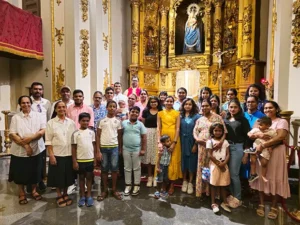Nithin Joji Karimpanmackal, a seminarian of the Syro-Malabar rite, from the diocese of Kerala (India), is in his third year of Theology at the Ecclesiastical Faculties of the University of Navarra and resides at the Bidasoa international seminary.
At 25 years of age, in addition to continuing his training in Pamplona, he has collaborated this summer in the pastoral care of the collegiate church and basilica of San Isidro, in Madrid, helping its parish priest, Don Ángel Luis Miralles, and attending to the small but fervent Catholic community of the Syro-Malabar rite that exists in the Spanish capital and is made up of about 80 people.
The Syro-Malabar Rite Mass
Every Sunday, the collegiate church of San Isidro celebrates a Syro-Malabar Rite Mass at five in the afternoon that lasts approximately two hours. This celebration is a meeting point for the faithful of this liturgical tradition in Madrid.
Nithin points out the great closeness that exists between the parish priests and the faithful in his diocese of Kerala, an aspect that he seeks to maintain in Madrid: “The Syro-Malabar rite comes from the apostle Saint Thomas. Currently, we have about 500 priests in Kerala,” he says proudly.
Queues to confess at San Isidro
During his stay in Madrid, Nithin has been impressed by the devotion of the people of Madrid towards San Isidro and the Jesus of the Great Power, venerated in the collegiate church. In addition, he has been surprised by the number of faithful who come with some frequency to confess: “It is impressive, there are queues to confess, something that is not so common in other places,” he says.
A vocation since the age of 15
Nithin was born on January 8, 1999 in Alappuzha, Kerala (India). He is the son of Joji Thomas and Sherly Joji, and has an older brother, Jithin Joji Thomas. His vocation to be a priest began at an early age: at the age of 15 he entered the minor seminary, after completing his primary education in his hometown, Manimala.
In 2014, he entered the minor seminary of the Archdiocese of Changanaserry in Kerala, where he resided during his formation. He subsequently graduated in Commerce, specializing in Finance and Taxation from St. Berchmans Autonomous College, affiliated to Mahatma Gandhi University, Kerala.
After completing his Bachelor’s degree in 2020, he continued his philosophical studies at the Jeevalaya Institute of Philosophy, Bengaluru, affiliated to Urbaniana University in Rome.
After his philosophical studies, Nithin participated in a regency program, serving as a secretary in the office of Archbishop Emeritus Joseph Powathil. He also collaborated with ‘Apostle’, an educational initiative of the archdiocese that supports students from grade 7 to higher levels, accompanying them in their vocational discernment.

 Training at the Bidasoa International Seminary
Training at the Bidasoa International Seminary
After completing the regency program, his bishop sent him to Spain to continue his theological training at the Bidasoa International Seminary and at the University of Navarra, in Pamplona.
«Thank God, I have completed my second year of Theology and I am grateful to the benefactors of the CARF Foundation who have supported me in my training. The experience of living with seminarians from different cultures and traditions is enriching, and the atmosphere in Bidasoa encourages a greater closeness to God,» Nithin emphasizes.

 Pauline Mathias, seminarian from Tanzania in Madrid
Pauline Mathias, seminarian from Tanzania in Madrid
Pauline Mathias is another seminarian, from Tanzania, from the diocese of Mwanza, who is carrying out her pastoral work in the parish of San Manuel González de San Sebastián de los Reyes in Madrid. She is studying 3rd year of Theology at UNAV and also resides at the Bidasoa International Seminary. “I am very happy to live with different seminarians from all over the world,” he said, thanking his benefactors for this opportunity.
A close relationship with the parishioners
Pauline explains that her pastoral activity in Madrid includes preparing the liturgy and the Mass, helping to distribute Communion. But what she has enjoyed most is getting to know and interacting with the parishioners and spending time with them, some of whom even like to invite her to their own homes to spend time. “The Christians in this parish are very kind, and it is surprising to see the number of people who frequently come to confess,” she says.
She has also been able to dedicate herself to giving catechism to the youngest to support the work of the parish priest, Don José María Marín, and so that they can be closer to Jesus Christ.
In addition, she highlights the sense of responsibility of the Catholics of her country in parish activities, something that, according to her, could also inspire Spanish Catholics. And she is grateful for all the love and support she has received and receives from the benefactors and friends of the CARF Foundation, thanks to whose help she can continue with her academic, spiritual and human formation.

